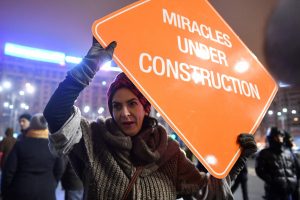 THE WASHINGTON POST
THE WASHINGTON POSTAT A time when democracy is eroding in several nations in Central and Eastern Europe, an encouraging countermovement has suddenly erupted in Romania, a formerly Communist nation of 20 million on the Black Sea. For the past week, huge demonstrations by hundreds of thousands of people have rocked the capital, Bucharest, and other major cities in what has been widely described as the largest political mobilization since the collapse of the Communist regime in 1989. The rallying point has been simple, direct and, given the country’s history, inspiring: a demand that the government not relax anti-corruption laws.
Romanian governments have been permeated with graft at least since the days of dictator Nicolae Ceausescu, but after joining the European Union in 2007 the nation’s political elite came under mounting pressure from Brussels to reform. The eventual result was the establishment of the independent National Anticorruption Directorate, which has been prosecuting cases at the rate of more than 1,000 a year — including those of senior political figures.
After handily winning a low-turnout election in December, the ruling Social Democratic Party perceived an opening to reverse the cleanup process. It first proposed a law that would pardon anyone serving less than five years for certain crimes — a measure that seemingly could apply to the party’s de facto leader, Liviu Dragnea, who received a two-year suspended sentence for electoral fraud. Then came a bolder stroke: On Jan. 31, the party issued a late-night emergency decree decriminalizing some forms of corruption if the amount of money involved was less than 200,000 Romanian lei, or about $48,000. That would get Mr. Dragnea off the hook on another corruption charge on which he faces trial, and allow him to become prime minister. It would also allow the government to resume the practice of buying the support of mayors and other local politicians across the country with handouts of cash.
The government appeared likely to survive after President Klaus Iohannis told Parliament on Tuesday that new elections were not called for, though a cabinet reshuffle may be necessary. The Social Democrats could still seek to gut the anti-corruption law through parliamentary action. But that would risk enraging an already aroused populace. Romanians have demonstrated that democratic values have taken root in the country over the past two decades, with the help of European allies and the United States. That’s an achievement that doesn’t benefit only their nation: It makes Europe more stable and more safe. The Trump administration should consider such progress before proposing to trash the European Union.
https://www.washingtonpost.com/opinions/global-opinions/from-romania-an-encouraging-sign-for-democracy/2017/02/07/45950c6a-ed60-11e6-9973-c5efb7ccfb0d_story.html?utm_term=.0fad8e5222a7



